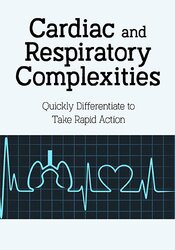

You are assessing the patient who just returned from endoscopy following a foreign body removal. The patient is complaining of his throat itching. On assessment, his vital signs are normal, but he appears anxious. Is this normal following the procedure? Do you put him on a cardiac monitor? Should you call a rapid response?
We have all been faced with the clinical dilemma when our patient has rapidly progressing dyspnea, tachypnea, fever, cough, and chest pain. What is happening? Distinguishing between heart failure, pneumonia, and ARDS can be difficult. Did you know that COPD could mask a pulmonary embolism? When your patient is wheezing, do you make the assumption it is asthma? Or could the presentation be caused by heart failure or an allergic reaction?
This recording will provide you with the confidence to recognize early and identify appropriate interventions to prevent further deterioration. We will discuss when non-invasive ventilation devices should - and should not - be used. If you are still struggling with blood gases, don't let blood gases intimidate you! Learn quick and easy ways to interpret ABG results. You will learn from actual patient stories to illustrate the complexities and co-morbidities of cardiac and respiratory diagnoses!
NOTE: Tuition includes one free CE Certificate (participant will be able to print the certificate of completion after completing the on-line post-test (80% passing score) and completing the evaluation).
Continuing Education Information: Listed below are the continuing education credit(s) currently available for this non-interactive self-study package. Please note, your state licensing board dictates whether self-study is an acceptable form of continuing education, as well as which credit types are acceptable for continuing education hours. Please refer to your state rules and regulations. If your profession is not listed, please contact your licensing board to determine your continuing education requirements and check for reciprocal approval. For other credit inquiries not specified below, please contact cepesi@pesi.com or 800-844-8260 before the event.
Materials that are included in this course may include interventions and modalities that are beyond the authorized practice of your profession. As a licensed professional, you are responsible for reviewing the scope of practice, including activities that are defined in law as beyond the boundaries of practice in accordance with and in compliance with your profession's standards.
This self-study program offers 120 instructional minutes of pharmacology content which is designed to qualify for 2.0 contact hours toward your pharmacology requirement.
PESI, Inc. is a provider approved by the California Board of Registered Nursing, Provider #: 17118 for 6.0 self-study contact hours.
** You will need to provide your license number to PESI. PESI must have this number on file in order for your hours to be valid.
PESI, Inc. is an approved provider by the Florida Board of Nursing. Provider #: FBN2858. These materials qualify for 6.0 self-study contact hours.

PESI, Inc. is an approved provider by the Iowa Board of Nursing. Provider #: 346. Nurses successfully completing these self-study materials will earn 6.3 self-study contact hours. Please email cepesi@pesi.com with your license number, include the title, speaker name and date. PESI must have this number on file in order for your hours to be valid.
This self-study activity qualifies for 6.25 continuing education clock hours as required by many national, state and local licensing boards and professional organizations. Save your activity advertisement and certificate of completion, and contact your own board or organization for specific requirements.
| File type | File name | Number of pages | |
|---|---|---|---|
| Manual - Cardiac and Respiratory Complexities (6.22 MB) | 78 Pages | Available after Purchase |

Robin Gilbert, MSN, RN, CEN, CPEN, has over 25 years’ experience in emergency nursing. She is both a certified emergency nurse and certified pediatric emergency nurse. Robin has experience as an emergency department manager, manager of cardiac & pulmonary rehabilitation and currently as the regional manager for staff development at Central Main Medical Center. She instructs the NCLEX review class for Kaplan and tutors nursing students online for a local college of nursing. Her experience also includes having been an item writer for the Board Certification of Emergency Nursing and a former chairperson. In her current role, Robin is able to remain up to date in the trends and best practice standards for care in emergency nursing. Robin received her BSN from Curry College, Massachusetts and her MSN from Saint Joseph’s College, Maine. Robin is an active member of the Emergency Nurses Association, the American Nurses Association, Society of Critical Care Medicine, and is a reviewer for the ANCC’s Pathway to Excellence.
Speaker Disclosures:
|
Cardiac and Respiratory Complexities: Quickly Differentiate to Take Rapid Action
Copyright: 04/18/2024 - Product Code POS077455 |
Access never expires for this product.
Visit our FAQ page at www.pesi.com/faq or contact us at www.pesi.com/info
Hemodynamics
Respiratory Diagnoses
Respiratory Interventions and Medications
Cardiac Diagnoses
Acute Coronary Syndrome
Cardiac Interventions and Medications
| 5 |
|
| 4 |
|
| 3 |
|
| 2 |
|
| 1 |
|
Satisfaction Guarantee
Your satisfaction is our goal and our guarantee. Concerns should be addressed to: PO Box 1000, Eau Claire, WI 54702-1000 or call 1-800-844-8260.
ADA Needs
We would be happy to accommodate your ADA needs; please call our Customer Service Department for more information at 1-800-844-8260.
PESI Mobile App
Access CE trainings on your phone or tablet through our free mobile app. Choose video or audio-only versions of online courses from the world’s best instructors, and complete your CE requirements anywhere, anytime, at your own pace.
Please wait ...